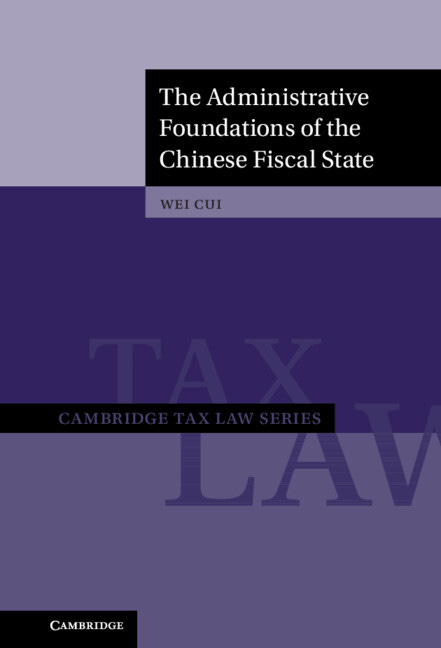Taxman against further cutting personal income tax in China
And it is right - any further cuts will only benefit the rich, as I highlighted in a 2023 book excerpt.
In August 2023, we shared an excerpt from the book The Administrative Foundations of the Chinese Fiscal State by Professor Wei Cui of the law faculty at the University of British Columbia.

In the excerpt, the former tax lawyer in New York and Beijing, who also served as Senior Tax Counsel at the China Investment Corporation, China's largest sovereign fund, gave a comprehensive introduction to how the economic elite in China hatched a deal with the Chinese government to benefit themselves when it comes to personal income tax (PIT) in China.
Professor Wei Cui summarized
Since 2008, China has steadily cut the PIT for the highest 10% or 5% of wage earners in the country. Contrary to observations from cross-country studies and studies of countries with long histories of PIT, China’s exemption from the PIT moved up—as opposed to down—the income distribution as China got richer in the last two decades. This has led to a dramatic reduction in the redistributive effect of the Chinese PIT.
In the past several months, Sheng Songcheng, Adjunct Professor of Economics and Finance at China Europe International Business School and former Director General of the Financial Survey and Statistics Department at the People’s Bank of China (PBoC), Yu Miaojie, President of Liaoning University, and other opinion leaders have again launched attacks at the already feeble PIT regime, in the name of stimulating consumption.
Unsurprisingly, Chinese media, also run by elites who might mistakenly believe they are poor, have widely platformed their well-intentioned but misinformed, regressive views in outlets like Southern Weekly and Guancha.
Professor Wei Cui also astutely observed in the book excerpt
The government’s repeated undercutting of the PIT since 2006 went against the preferences of bureaucrats in the Ministry of Finance and the State Administration of Taxation.
This time, the taxman defended against further cuts yesterday, publishing a rebuttal from Renmin University of China professor Yue Ximing on its front page.
It’s very straightforward: the genuinely poor Chinese wage earners cannot possibly benefit from further cuts of the PIT since they already don’t have to pay PIT. And these little guys don’t have discourse power against the tax cuts for the rich.
As you will read in the following translation, only 30% of wage earners pay PIT, which, by definition, means they are in the top 30% of the country in terms of regular income.
Among them, less than 40% pay a PIT rate above 3%. In other words, any further cuts to PIT, including increasing exemptions, will only benefit the top 12% of wage earners in the Communist Party-governed socialist country.
我国个人所得税“起征点”不宜进一步提高
China’s personal income tax “threshold” should not be further raised
The personal income tax “threshold” in China should not be further raised. The “threshold” of personal income tax has attracted widespread attention. During the 2025 National People’s Congress, some representatives suggested raising the individual income tax “threshold” to 10,000 yuan per month. Others proposed raising the “threshold” from 60,000 yuan per year to 100,000 yuan per year, emphasizing the necessity of increasing the threshold from the perspective of stimulating consumption.
The personal income tax “threshold” is the colloquial term for the basic deduction standard, referring to the portion of a taxpayer’s income that is exempt from personal income tax, used to meet basic living needs. Currently, the basic deduction standard for comprehensive individual income tax in China is 5,000 yuan per person per month, which was determined after comprehensive consideration of factors such as urban residents’ average basic consumption expenditure, the average number of dependents per employed person, the consumer price index, and some forward-looking considerations. Although it has not been raised since 2018, in addition to the basic deduction, taxpayers can also enjoy special deductions for social security contributions, children’s education, personal pensions, and other deductions. Moreover, in 2022, a special deduction for the care of children under three years old was introduced, and in 2023, the standards for three special additional deductions—childcare, children’s education, and elderly care—were raised, better adapting to changes in the economic and social environment. The basic deduction of personal income tax involves significant issues such as fiscal revenue generation capacity, tax system fairness, and income distribution regulation. Therefore, it is not advisable to further increase the threshold at this time. The reasons are as follows:
Firstly, the current basic deduction standard for personal income tax in China is not low. The basic deduction refers to the portion of income used by taxpayers to meet basic living needs, which is exempt from personal income tax. It does not mean that all income spent on consumption is exempt from tax. There is no clear data on how high the basic living needs of urban and rural residents in China are. Reference can be made to minimum living standards and minimum wage standards, with the basic deduction being much higher than both. Internationally, the basic deduction’s ratio to the average wage is often used to measure the high or low level of the personal income tax threshold. If the ratio is high, it indicates that the basic deduction is relatively high compared to the average wage, meaning taxpayers can deduct a larger amount from their income, thus reducing their tax burden. According to data from the Organisation for Economic Co-operation and Development (OECD), the basic deduction-to-average wage ratios in Australia, France, South Korea, Japan, the UK, and the US are 0.19, 0.26, 0.1, 0.03, 0.29, and 0.17, respectively. In comparison, in 2024, the basic deduction-to-average wage ratio in China for non-private sector employees is 0.49, and for private sector employees, it is 0.88. This shows that the current basic deduction standard in China is not low.
Secondly, increasing the basic deduction will weaken the income distribution regulation function of personal income tax. The effective role of personal income tax in regulating income distribution depends on a certain scale of tax revenue. The goal of personal income tax in regulating income distribution is not that only high-income people pay taxes, while middle- and low-income people are exempt, but rather that high-income people pay more, and middle- and low-income people pay less, with the tax rate proportional to income. Developed countries achieve this in their personal income tax design by setting a relatively low basic deduction to ensure that more people pay taxes, thus maximizing the effect of personal income tax in regulating income distribution. In contrast, in China, due to the relatively high basic deduction, a significant portion of the middle- and low-income population does not pay personal income tax. In this case, further raising the basic deduction may lead to situations where low-income groups, who already do not pay taxes, do not benefit, while middle- and high-income groups experience greater tax reductions, thus weakening the income distribution regulation function of personal income tax.
Thirdly, excessively high basic deductions will limit the ability of China’s personal income tax system to generate tax revenue. From the perspective of the proportion of personal income tax in total tax revenue, according to the International Monetary Fund (IMF) publication “Government Finance Statistics,” the average share of personal income tax in total tax revenue in countries under statistical consideration in 2022 was 22.4%. In the US, it was 56.4%, in Russia, 18.8%, and in China, it was only 8.3%. The average proportion in countries with similar economic development levels to China was 21.9%. The relatively low share of personal income tax in total tax revenue in China, compared to both developed countries and those with similar economic development levels, is partly due to the relatively high basic deduction, resulting in fewer taxpayers and a narrower tax base. If the basic deduction is further raised, it will further weaken the ability of the personal income tax system to generate tax revenue.
In terms of the current situation, according to tax data released by the State Administration of Taxation in 2024, more than 70% of individuals earning comprehensive income in China are exempt from paying personal income tax. Among the remaining less than 30% of actual taxpayers, over 60% are subject to the lowest tax rate of 3%, with relatively small amounts of tax paid. Individuals earning less than 120,000 yuan per year, after deducting the basic deduction and other deductions, generally do not need to pay personal income tax, or only a small amount. Among personal income tax filers in China, those with an annual income over 1 million yuan account for about 1% of the total filers, but they contribute more than 50% of the total personal income tax collected. The personal income tax paid by the top 10% of income earners in terms of declared income accounts for more than 90% of the total. This indicates that under the current basic deduction of 5,000 yuan, China’s personal income tax system effectively plays a role in adjusting the tax burden and adapting well to the current economic and social development. Therefore, there is no need to increase the threshold at this time. As for supporting pensions and encouraging childbirth, these can be achieved through adjustments to special additional deductions.
Get the book from Cambridge University Press and Amazon!





